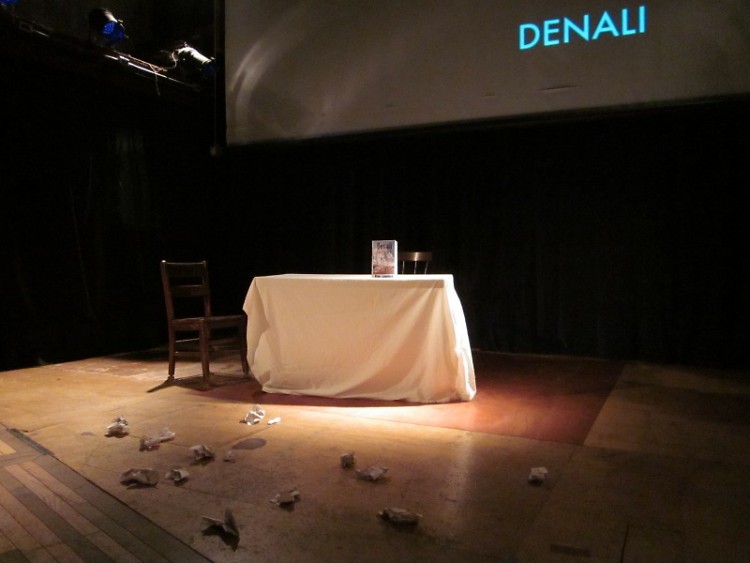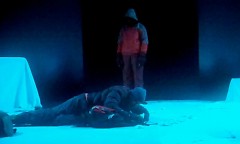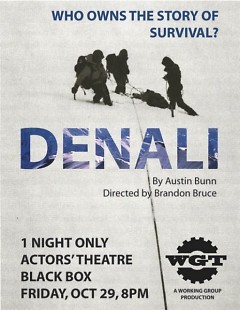"People give you things so you'll open the door. So they can see inside."
On Nov. 5, local playwright Austin Bunn gave 50 of us at Spectrum Theater's black box space the gift of a high-stakes plot and intricately connected characters in the form of Denali. He gave us the gift of seeing inside the struggles of real characters in very human circumstances (albeit with a literally monumental background of Mount McKinley, the highest point in North America), the combination of which epitomizes why we all fell in love with the theater in the first place: to experience a compelling story.
Before the play begins, three best friends decide to attempt to climb Denali, the highest point in North America. One dies on the mountain under questionable circumstances, the other two barely make it home, and the sister of the dead friend is destroyed by her brother's death. When one of the surviving friends publishes his account of what happened on the mountain, the stage is set for us to see inside the personal-and inextricably linked struggles to cope of the characters who remain.
The play begins with Doug (Sean Christopher Lewis), one of the two survivors of the climb, reading from the recently published account of their journey written by the other survivor, Finn (Martin Andrews). It is obvious from the torn pages of the book littering the floor that the tales the two men are telling don't jibe, and Doug isn't happy about it. When the sister of the dead climber, Abby (Jennifer Fawcett), enters and we discover she's living with Doug, the stakes get even higher.
The hour-long show has rich relationships and unexpected reveals. My favorite was the flawless on-stage transition from Finn dying in a coarse shelter on Denali to teenage Abby's house where the two of them are saying their goodbyes the night before the climb. As Fawcett transitions from a masculine manifestation of Finn's cerebral edema to a lusty teenaged girl, Andrews transitions from a dying weakling to a healthy young adrenaline junkie. The overlapping dialogue (Abby: "I so want to get caught." Finn: "The swelling of the brain at high altitudes...") and the visual of the two characters stripping off their clothing was thrilling. I wished that all of the scene changes would have worked to blend the past and present, but still, none of them were clunky.
We never do really get rid of who we were in our youth, or that nagging question Finn poses to Abby "What makes you feel like you're alive?" This play doesn't answer it for you, but it does make you think about it (Damn it! It's easier not to!). Abby challenges Finn the night before he climbs, asking"So you're saying fear makes experience?...What about love?..." And Doug, angrily justifies what he's settled for: "What are you going to find in a big city that I can't get here? Fucking people is what you're going to find." That cracked me up, and the show is peppered with lines (not punch-lines, per se) that made me laugh because they were so true. "The body loves fried food" as an emotional soother was another.
All of the characters time jump, and Lewis and Fawcett play two additional characters, including Fawcett's very funny TV talk show host. Andrews' physicalization and emotional commitment were stellar throughout the play, which was well supported by the writing. I followed his version of the story and reactions to new information, while the other two characters' versions left me with questions about what really happened on—and after—the mountain. Were the two surviving friends culpable in the third one's death? Who made the choice to split up the group or to abandon the one who went on alone? Even with the discovery of the dead man's camera, it isn't clear what really happened. Maybe that was intentional or a function of cutting for time, but the writing and acting was so good that I would have been happy to watch them for another 15 minutes or so to leave with more clarity.
We go to the theater to have a story-to lose ourselves in comedy and tragedy and to see ourselves in the heros and the villains. Denali is the best kind of story, where the situations and characters are complex amalgamations of these, and the audience leaves with sympathy and contempt for everyone.
The Rapidian, a program of the 501(c)3 nonprofit Community Media Center, relies on the community’s support to help cover the cost of training reporters and publishing content.
We need your help.
If each of our readers and content creators who values this community platform help support its creation and maintenance, The Rapidian can continue to educate and facilitate a conversation around issues for years to come.
Please support The Rapidian and make a contribution today.




Comments
to have this review -- I completely agree about the need for reviews and critical cultlure in the Grand Rizzle. and yes, Amy, I want your further notes!
Oh and it was Oct. 29th when the show opened -- you just couldn't shake it until November 5!
I was there for the performance, and am very glad I saw it. (And agree with McFadden's great review.) I found the question of a writer's culpability particularly interesting. Who owns a story? Who has the right to sell the story? And whose interpretation of memory becomes the truth? Especially in our era of blogging and tweeting and Facebook status updates...is there any obligation to stay quiet about an event that you want to talk about if someone else involved in the experience doesn't?
Bunn's play resonates and represents the best in live theater: an experience that makes you feel and maybe more importantly think.
I hope it becomes a full production and would like to see it lengthened to a full-length play. There were a couple of parts in the play that still need tightening, but that's part of the beauty of a new work too.
Thanks Tanya for the thoughts -- I WANT THEM. I'm not sure I want to expand the play, that's the rub. I designed it for a Fringe run, which can only be an hour long. If i add stuff, I have to take out something. Next time you see me, TELL ME YOUR THOUGHTS.